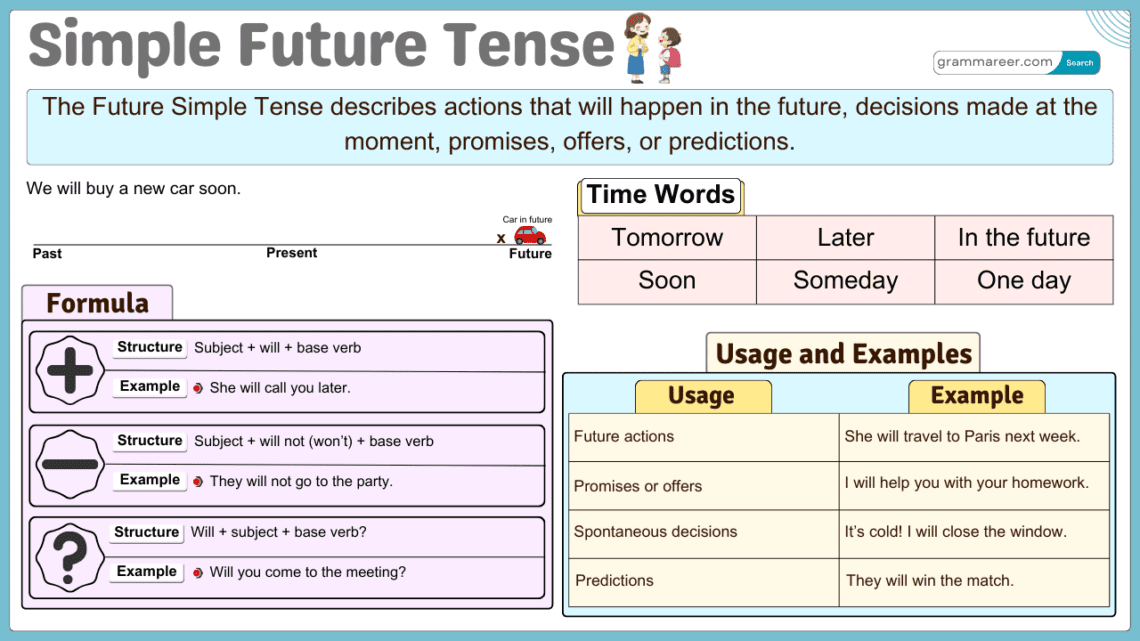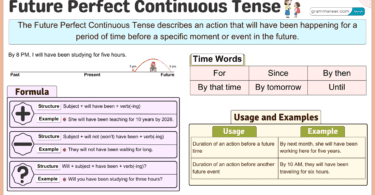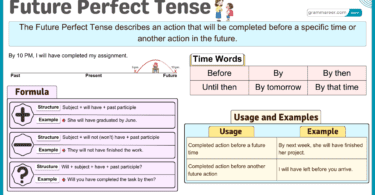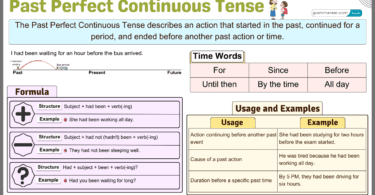The Simple Future Tense describes actions that will happen in the future, including decisions made at the moment, predictions, promises, offers, and plans. It plays an important role in English grammar and helps express future intentions clearly. Learning its structure and usage improves both speaking and writing, while also enhancing your understanding of tenses.
Table of Contents
Sentence Structures of the Simple Future Tense
The Simple Future Tense has three main structures: affirmative, negative, and interrogative sentences.
Affirmative Sentences
Structure: Subject + will + Base Form of the Verb + Object
Examples:
- Aisha will visit Turkey next year.
- They will play football tomorrow.
In both examples, will is used for all subjects, followed by the base form of the main verb.
Negative Sentences
Structure: Subject + will not (won’t) + Base Form of the Verb + Object
Examples:
- Bilal will not watch TV tonight.
- We won’t eat junk food anymore.
The contraction won’t is commonly used instead of will not.
Interrogative Sentences
Structure: Will + Subject + Base Form of the Verb + Object + ?
Examples:
- Will Hamza study for his exam?
- Will they travel to Europe next summer?
Double Interrogative Sentences
Structure: Question Word + will + Subject + Base Form of the Verb + Object + ?
Examples:
- What will Fatima do tomorrow?
- Where will they go for their vacation?
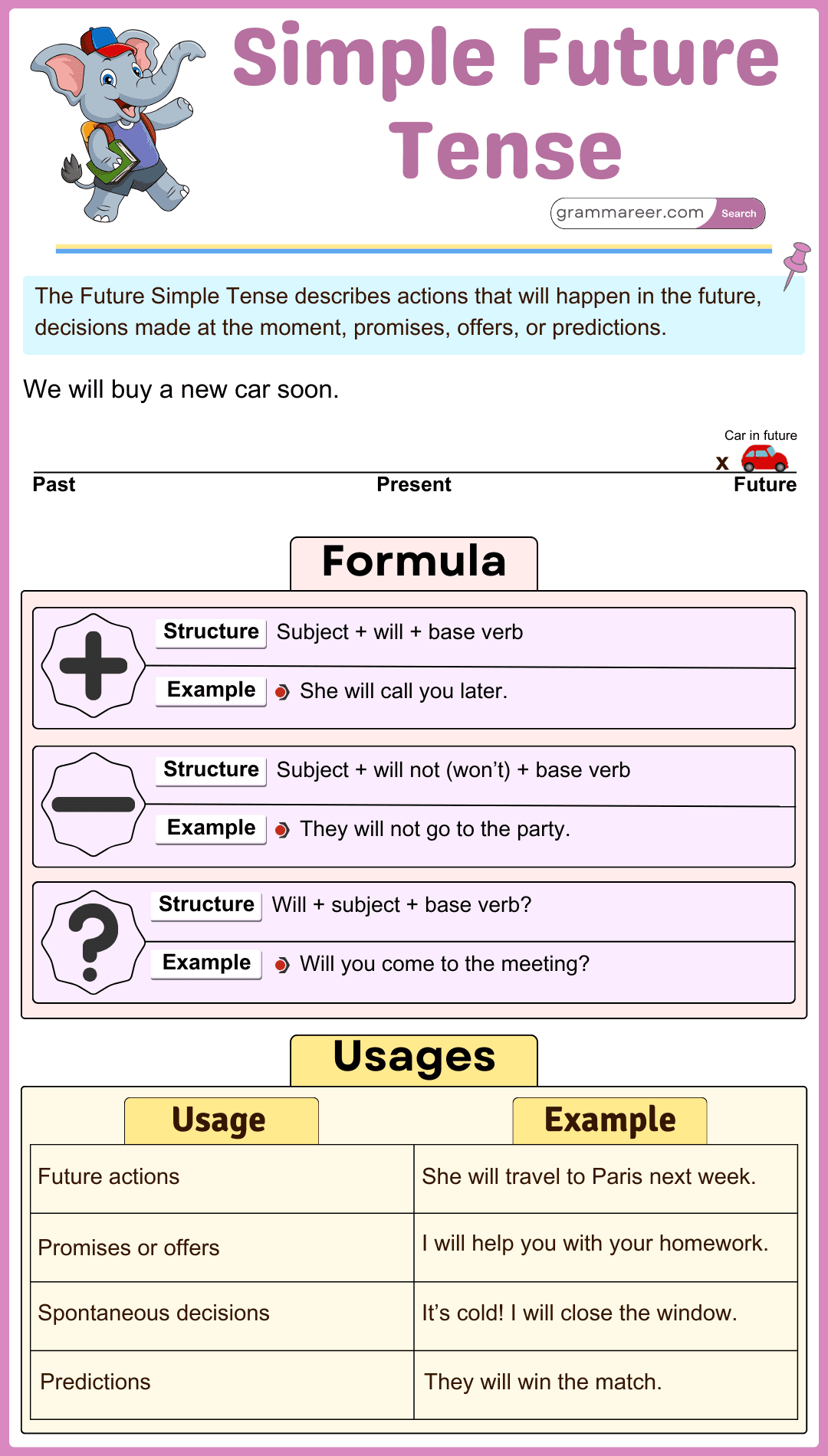
Subject-Verb Agreement in Simple Future
In the Simple Future Tense, will is used with all subjects, both singular and plural.
| Subject | Helping Verb | Main Verb Example |
|---|---|---|
| I | will | will study |
| You | will | will play |
| He/She/It | will | will write |
| We/They | will | will learn |
| The teacher | will | will explain |
| My parents | will | will travel |
Time Expressions in Simple Future
Time expressions in the Simple Future Tense indicate when an action will happen. Common examples include “tomorrow,” “soon,” “next week,” “in the future,” “later,” and “by tonight.” These expressions help clarify the timing of future events or actions.
- Tomorrow: She will call you tomorrow.
- Next week/month/year: We will visit Lahore next week.
- Soon: They will arrive soon.
- In a few minutes/hours/days: I will finish my work in a few hours.
- Later: He will meet you later.
Adverb Placement in Simple Future
Adverbs like definitely, probably, surely, soon are placed between ‘will’ and the base verb.
Examples:
- She will definitely attend the meeting.
- They will probably arrive late.
Uses of the Simple Future Tense
The Simple Future Tense is used to describe actions that will happen in the future. It is formed using will + base form of the verb or am/is/are going to + base form of the verb.
1. Predictions About the Future
It is used to predict what might happen in the future based on personal opinions or assumptions.
- I think it will rain tomorrow.
- She will become a great doctor someday.
2. Spontaneous Decisions Made at the Moment of Speaking
It is used when deciding to do something suddenly without prior planning.
- I’m hungry. I will order some food now.
- Don’t worry, I will help you with your homework.
3. Promises, Offers, and Threats
It is used to make promises, offers, or threats.
- I will always support you. (Promise)
- Will you carry this bag for me? (Offer)
- If you don’t stop, I will call the teacher. (Threat)
4. Planned or Scheduled Future Events (with “Going to”)
It is used to talk about future plans or intentions, especially when the decision has already been made.
- We are going to visit Paris next summer.
- She is going to start a new job next week.
Simple Future Tense vs. Past Simple Tense
The Simple Future Tense describes actions that will happen in the future, while the Past Simple Tense refers to actions that happened and were completed in the past.
| Feature | Simple Future Tense | Past Simple Tense |
|---|---|---|
| Usage | Action that will happen in the future. | Completed action in the past. |
| Time Ref. | Future time (tomorrow, next week, soon). | Specific past time (yesterday, last year, in 2010). |
| Example | I will travel to Paris next month. | I traveled to Paris last year. |
| Formation | will + base verb (She will study.) | verb + -ed (regular) or irregular form (She studied / went.) |
| Focus | Action that is yet to happen. | Action that is completed. |
| Signal Words | Tomorrow, next, soon, later. | Yesterday, ago, last, when. |
| Context | They will attend the meeting tomorrow. | They attended the meeting yesterday. |
Short Answers in Simple Future
Short answers in the Simple Future Tense provide brief, clear responses to questions about future events or actions. They help keep conversations natural and concise without repeating the full sentence.
| Question | Short Answer |
| Will you come to the party? | Yes, I will. |
| Will she join the meeting? | No, she won’t. |
| Will they visit us? | Yes, they will. |
| Will Ahmed study tonight? | No, he won’t. |
Question Tags in Simple Future
Question tags in the Simple Future Tense are used to turn statements about future events into questions, helping to confirm information or seek agreement. They make conversations more interactive and natural when discussing plans or predictions.
| Sentence | Question Tag |
| You will come to the party, won’t you? | won’t you? |
| He will play football, won’t he? | won’t he? |
| They will travel, won’t they? | won’t they? |
| She will study, won’t she? | won’t she? |
Examples of Simple Future in Use
Here are more examples to help you understand the Simple Future Tense:
- Affirmative:
- Hassan will eat lunch soon.
- We will live in Karachi next year.
- She will join the team tomorrow.
- Negative:
- She will not finish the project today.
- They won’t attend the meeting.
- Ahmed won’t agree to that plan.
- Interrogative:
- Will you attend the conference?
- Will Hina call her friend?
- Will they travel abroad this year?
Common Mistakes with Simple Future
Many learners make errors in this tense. Here are some common mistakes and their corrections:
- ✅ She will go to the market.
- ❌ She go to the market.
- ✅ They won’t eat lunch.
- ❌ They will not eating lunch.
- ✅ Will you see that movie?
- ❌ Will you seeing that movie?
- ✅ The baby will sleep soon.
- ❌ The baby will sleeping soon.
FAQs
To talk about future actions, plans, predictions, and promises.
Example: “Ali will visit his friend tomorrow.”
Subject + will + base verb + object.
Example: “She will study tomorrow.”
Subject + will not (won’t) + base verb + object.
Example: “He will not go to school.”
Will + subject + base verb + object?
Example: “Will you come to the party?”
Yes, but mostly in formal contexts or with I/we.
Example: “Shall we go?”
Yes. Example: “I/You/He/She/They will travel.”
You May Also Like

